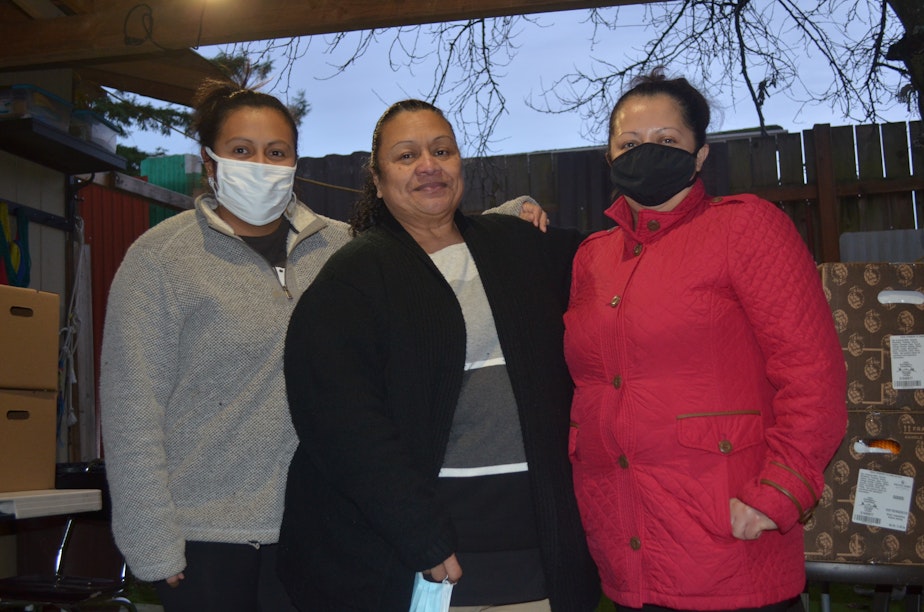As Latinos wait for vaccines in Seattle area, they keep getting sick

Someone knocks at Isabel Quijano's door in White Center, and when she opens it, there's a man on her step telling her that he just got his Covid vaccine.
Quijano seems pleased — she had helped him book his vaccine appointment, something she's been doing a lot. She’s a community health worker, and, for the past year, she’s been doing whatever her community needs most. Right now, that's help scheduling vaccine appointments.
"The number of people who call me every day — it’s never ending," she said in an interview in Spanish. "They give me their information and everything, and I make their appointments."
Cases are spiking right now in the South Seattle and South King County neighborhoods where many Latinos live. Over the course of the pandemic, Latinos in King County have been almost four times as likely to get Covid as white people, and three times as likely to die of it.
But fewer Latinos have received a Covid dose: one in five Latinos compared to one in three white people in King County.
Quijano said the biggest barrier to Latinos getting vaccinated is language, because everything’s in English. The second barrier is technology. "They say, 'Everyone has a phone,'" Quijano said. "Sure, but there are times when people don’t even know how to send a text message."
Sponsored
For the most part, Quijano gets people appointments at a mass vaccination center in West Seattle, which the city opened to serve people of color.
One big issue Quijano can’t solve is transportation to vaccine sites. She said she’s tried to work with King County Metro to see if they could help, but, so far, no dice.
On top of these logistical issues, Angie Hinojos, executive director of the Centro Cultural Mexicano, said the vaccine phasing tiers created by the state Department of Health (DOH) were "completely inequitable."
Hinojos said the occupation groups included in earlier tiers — health care workers and teachers — are majority white. And people over 65 years old skew white as well.
A spokesperson for DOH said they took that into consideration when they included people 50 and older who live in multigenerational homes in an early tier.
Sponsored
But Hinojos said, from her perspective, that wasn’t enough.
"Why have they not included Latinos in the current phasing?" she said. "If you wanted to find a way to fence us out, this phasing plan pretty much does it."
Take restaurants and construction. Many Latinos work in both of those industries, which have had more Covid outbreaks than most other workplaces in Washington. Restaurants have had 281 outbreaks, for example, and construction 209, while grocery stores have only had 167 outbreaks.
But, for the first three and a half months of the vaccine rollout, restaurant and construction workers were not eligible for vaccines. The DOH spokesperson said that’s because the state simply didn’t have enough doses.
“We know this is frustrating for those who have to wait a little longer for their vaccine,” she said.
Sponsored
But Hinojos said the issue isn’t frustration: It’s a matter of life or death for those who have to continue going to work at high-risk workplaces without any protection. She said, during the months that restaurant and construction workers couldn’t get the vaccine before finally becoming eligible on Wednesday, they continued to contract the disease and bring it home.
"I just heard about a group of eight or nine who worked together, and Covid got spread, and 50 members of their families, their combined families have Covid — all Latino," Hinojos said, referring to an event she said happened in February.
Hinojos said she is doing what she can to help Latinos who are eligible get vaccinated. She said she looks for vaccine clinics where staff treat Latinos with respect. That’s where she sends people looking for appointments.
Opening up eligibility alone won’t close the gap between those who have easy access to vaccines, and those who do not, said Leo Morales, the director of the University of Washington’s Latino Center for Health and a professor at the UW School of Medicine.
Morales said what’s needed is bringing vaccines to people where they are.
Sponsored
“I don’t think the solution is just to open up mass vaccination sites,” he said. “That just doesn't work.”
Morales said what has been working are pop-up vaccine clinics at churches and community organizations, and mobile vaccination teams; there just aren’t enough of them. He said, to bring up the rate of vaccination among Latinos, state and local governments should form more partnerships with trusted community organizations and leaders — people who are already doing the work, like Isabel Quijano in White Center, and Angie Hinojos.
“When the state says, ‘Oh, we have all these barriers, and we don't know how to get around them,’” Hinojos said, “my response is, ‘We're already doing that. But you're not working with us. You're not utilizing the knowledge that we have, and the trust that we have.’”




